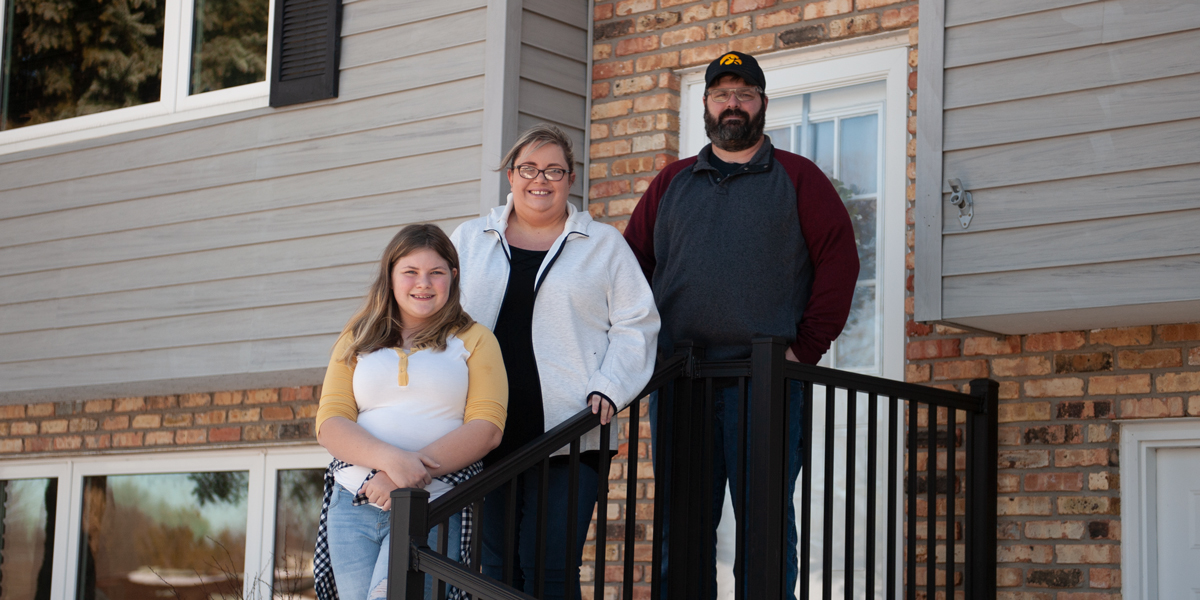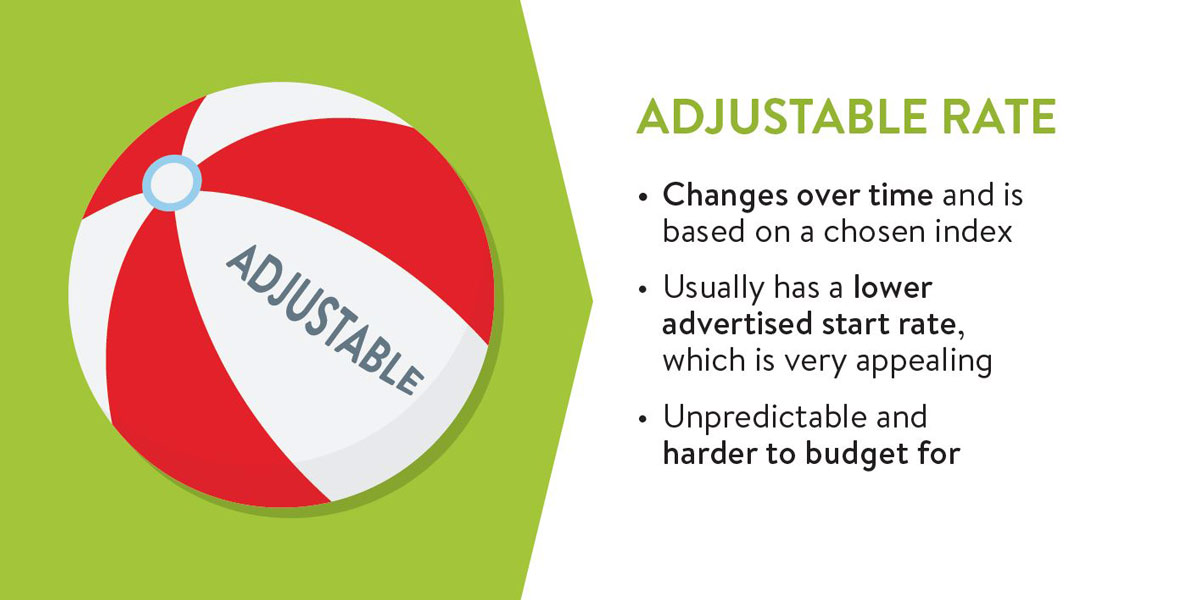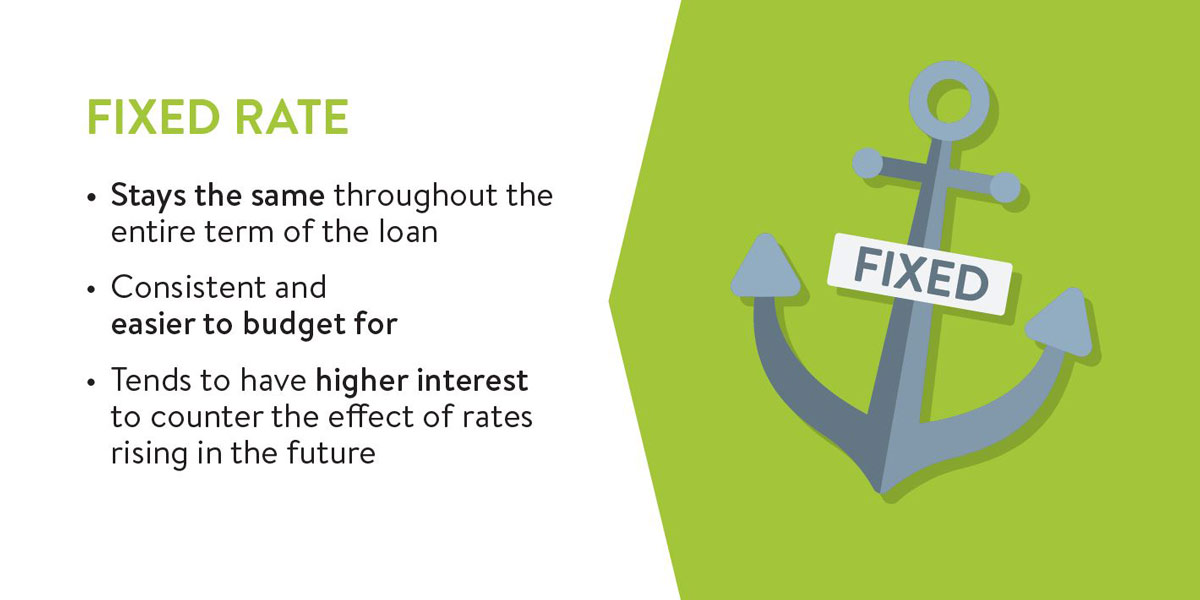 Members Stephanie and Jason Bergfeld settle into their new home with daughter, Natalie, in Dubuque,
Iowa. (M. Blondin/Dupaco photo)
Members Stephanie and Jason Bergfeld settle into their new home with daughter, Natalie, in Dubuque,
Iowa. (M. Blondin/Dupaco photo)
Could an adjustable-rate mortgage help you buy your home?
If you’re trying to buy a house today, it can feel like an uphill battle.
Interest rates continue to climb in an already expensive (and competitive) market. So, it’s worth weighing all your borrowing options.
An adjustable-rate mortgage, or ARM, can make homeownership more affordable in times like this. Here’s why: An ARM’s initial interest rate is typically lower than a traditional home loan’s, allowing you to pay less interest each month.
“It’s a unique rate environment right now. And many homebuyers haven’t seen interest rates this high,” said Dupaco Community Credit Union’s Erin Douglass, mortgage lending consultant supervisor. “Rates are ultimately still low. But it’s worth having a conversation about adjustable-rate mortgages now.”
Learn how an ARM works—and what to consider when deciding whether it’s a good fit for you.
These small changes can help you buy a house >
How an adjustable-rate mortgage works
With an ARM, your interest rate is locked for a period and can then adjust annually over the life of your loan. That’s why ARMs are also called variable-rate mortgages—your rate can change at specific intervals.
This differs from a traditional fixed-rate home loan, where your interest rate (and monthly payment) remains the same.
Why would you take out a loan where the interest rate can increase over time?
“The goal is to buy yourself a little time to hopefully refinance your loan and get into a better fixed-rate loan in the future,” Douglass said.
ARM example
ARM loans’ names can look confusing. But once you know what the numbers mean, it’s easier to understand how they work.
Let’s use the example of a 5/1 ARM, amortized over 30 years:
- The first figure (5) is the number of years your initial interest rate is locked. You’re guaranteed that your rate will not change during this time.
- The second number (1) is how often your interest rate can change after that initial period.
- Amortized is the loan’s full term (if you keep it that long).
So, with a 30-year 5/1 ARM, your initial interest rate stays the same for the first five years of your loan. After that, your interest rate (and monthly loan payment) will adjust annually for the remaining 25 years of your loan based on what’s happening in the market.
But your interest rate can only adjust so much.
At Dupaco, for example, your interest rate won’t change more than 2% during each periodic adjustment. And it won’t change more than 6% over the life of the loan.
Explore our first-time homebuyer resources >
Benefits of an adjustable-rate mortgage
During your home-buying search, you’ve probably noticed that ARMs have lower interest rates. (Fixed-rate loans tend to be higher to counter the effect of rates rising in the future.)
The ARM’s lower interest rate means you’ll save money by paying less interest each month during the lower fixed-rate period.
Everyone’s situation is unique. But here are some times when an adjustable-rate mortgage might be beneficial:
- You plan to sell your home soon. The adjustable rate won’t impact you after you sell your home.
- You plan to eventually refinance your home loan to get a better long-term loan. Again, the adjustable rate will no longer apply once your loan changes to a fixed rate.
- You plan to pay off your home loan before the adjustable rate begins. Maybe you’re receiving an inheritance or another lump sum that you plan to use to pay off your loan.
- You have room in your budget to accommodate a potentially fluctuating loan payment if you don’t qualify to refinance your home loan immediately.
Your fixed-rate period gives you time to decide what’s next:
- Sell your home.
- Stay in your home and pay off your loan.
- Stay in your home and refinance into a fixed-rate loan.
- Stay in your home and pay a higher interest rate (and payment).
“You have time to figure out what this home means to you,” Douglass said.
When an ARM might not be right for you
An adjustable-rate mortgage isn’t right for everyone, though.
Ultimately, it depends on your financial security and comfort level.
With an ARM, it’s important to understand that you’ll eventually need to refinance your loan—or make higher monthly payments.
Knowing this, it’s good to ask yourself a few questions:
- What if you don’t qualify to refinance when your rate increases? Or, you can’t sell your house right away? Can you afford to make a higher payment?
- Will you stay up at night not knowing what your future rate and payment will be? Or do you have a plan that you’re comfortable with?
“If you think you’ll worry too much about it, it’s not right for you,” Douglass said. “They’re not for everybody. But if we aren’t at least having the conversation, we aren’t doing our job to educate you about all of your options.”
What to remember with an ARM
Remember, you’ll need to eventually do something with your adjustable-rate loan—sell your home, pay off your loan, refinance it or pay a higher interest rate.
You’ll get notified when your interest rate will adjust.
But it’s your responsibility to take the next step. Contact your lender to discuss your options.
“This is not a loan that you can set and forget about it,” Douglass said. “You need to have an idea of what your plan is.”
And you don’t have to wait for your initial locked period to end to explore your options. Maybe interest rates go down, or you make great progress on your loan balance. These are great times to ask your lender if you should make any changes to your loan.
“Just because you get that fixed rate for a time doesn’t mean you have to keep it that whole time,” Douglass said. “It never hurts to reach out and ask your lender, ‘Does it make sense to do anything different with this?’”




